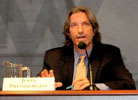
Yesterday morning, John Prendergast spoke about U.S. policy and ending the war in eastern Congo at the Woodrow Wilson International Center for Scholars in Washington, D.C. Drawing on experiences from his recent trip to Congo, Prendergast spoke about the realities on the ground in Congo and offered some policy recommendations for U.S. and international actors.
Prendergast began by discussing the “severe indiscipline” and internal divisions within the Congolese army that have been exacerbated by the recent attempted integration of militia groups into the army. With war criminals wanted by the International Criminal Court serving in leadership positions within the Congolese army and some rebel units still effectively intact, Prendergast asked, “How can you stop impunity?”
Prendergast also spoke at length about one of the most brutal rebel groups operating in Congo, the FDLR, whose leadership was responsible for carrying out the Rwandan genocide in 1994. Prendergast emphasized that, until recently, the Congolese army had been supporting the FDLR, and since not all army officers have severed ties with the rebels, the FDLR is routinely warned of impending government attacks. These cozy relations, coupled with rebels’ involvement in the highly profitable trade in conflict minerals and external support from FDLR leaders in the diaspora, has allowed the rebels to intensify their attacks against civilians in eastern Congo.
The reason behind these increased FDLR attacks is the MONUC offensive currently being waged by joint U.N. and Congolese forces, as Prendergast explained. The offensive takes what Prendergast called a “whack-a-mole” approach to weeding out the FDLR, killing as many individual rebels as possible using a purely military strategy. Prendergast denounced this offensive as inadequate, and instead offered a more comprehensive approach for addressing the FDLR and broader challenges in eastern Congo.
To defeat the FDLR, Prendergast said, the international community needs to enhance pressure on the military to go after rebels, target and prosecute war criminals living abroad, strengthen exit opportunities for militia members, improve civilian protection, and secure and legalize former FDLR mining operations. For the region as a whole, Prendergast proposed a “3P” approach: protection of people, punishment of war criminals, and peacemaking by promoting transparency of supply chains for conflict minerals and improved Rwanda-Congo relations. For conflicts like those in Iraq and Afghanistan, such comprehensive approaches are undertaken as a rule. In contrast, international actors simply “fling one thing at Africa and hope [the problems] will go away.”
Indeed, convincing the international community – and even our own U.S. government – to rethink this approach is a challenging feat, but deep-seated conflicts like Congo’s demand this shift if its interconnected causes are ever to be dealt with conclusively.
Check back soon for the video of the event. We’ll bring it to you as soon as it is available.

